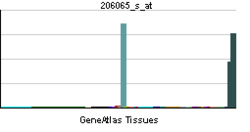- DPYS
-
Dihydropyrimidinase is an enzyme that in humans is encoded by the DPYS gene.[1][2]
Dihydropyrimidinase catalyzes the conversion of 5,6-dihydrouracil to 3-ureidopropionate in pyrimidine metabolism. Dihydropyrimidinase is expressed at a high level in liver and kidney as a major 2.5-kb transcript and a minor 3.8-kb transcript. Defects in the DPYS gene are linked to dihydropyrimidinuria.[2]
Interactive pathway map
Click on genes, proteins and metabolites below to link to respective Wikipedia articles. [3]
Fluorouracil (5-FU) Activity edit
References
- ^ Hamajima N, Matsuda K, Sakata S, Tamaki N, Sasaki M, Nonaka M (Jan 1997). "A novel gene family defined by human dihydropyrimidinase and three related proteins with differential tissue distribution". Gene 180 (1-2): 157–63. doi:10.1016/S0378-1119(96)00445-3. PMID 8973361.
- ^ a b "Entrez Gene: DPYS dihydropyrimidinase". http://www.ncbi.nlm.nih.gov/sites/entrez?Db=gene&Cmd=ShowDetailView&TermToSearch=1807.
- ^ The interactive pathway map can be edited at WikiPathways: "FluoropyrimidineActivity_WP1601". http://www.wikipathways.org/index.php/Pathway:WP1601.
Further reading
- Thomas HR, Ezzeldin HH, Guarcello V, et al. (2008). "Genetic regulation of beta-ureidopropionase and its possible implication in altered uracil catabolism.". Pharmacogenet. Genomics 18 (1): 25–35. doi:10.1097/FPC.0b013e3282f2f134. PMID 18216719.
- Thomas HR, Ezzeldin HH, Guarcello V, et al. (2008). "Genetic regulation of dihydropyrimidinase and its possible implication in altered uracil catabolism.". Pharmacogenet. Genomics 17 (11): 973–87. doi:10.1097/FPC.0b013e3282f01788. PMID 18075467.
- van Kuilenburg AB, Meijer J, Dobritzsch D, et al. (2007). "Clinical, biochemical and genetic findings in two siblings with a dihydropyrimidinase deficiency.". Mol. Genet. Metab. 91 (2): 157–64. doi:10.1016/j.ymgme.2007.02.008. PMID 17383919.
- Rual JF, Venkatesan K, Hao T, et al. (2005). "Towards a proteome-scale map of the human protein-protein interaction network.". Nature 437 (7062): 1173–8. doi:10.1038/nature04209. PMID 16189514.
- Gerhard DS, Wagner L, Feingold EA, et al. (2004). "The status, quality, and expansion of the NIH full-length cDNA project: the Mammalian Gene Collection (MGC).". Genome Res. 14 (10B): 2121–7. doi:10.1101/gr.2596504. PMC 528928. PMID 15489334. http://www.pubmedcentral.nih.gov/articlerender.fcgi?tool=pmcentrez&artid=528928.
- Strausberg RL, Feingold EA, Grouse LH, et al. (2003). "Generation and initial analysis of more than 15,000 full-length human and mouse cDNA sequences.". Proc. Natl. Acad. Sci. U.S.A. 99 (26): 16899–903. doi:10.1073/pnas.242603899. PMC 139241. PMID 12477932. http://www.pubmedcentral.nih.gov/articlerender.fcgi?tool=pmcentrez&artid=139241.
- Fukada M, Watakabe I, Yuasa-Kawada J, et al. (2001). "Molecular characterization of CRMP5, a novel member of the collapsin response mediator protein family.". J. Biol. Chem. 275 (48): 37957–65. doi:10.1074/jbc.M003277200. PMID 10956643.
- Hamajima N, Kouwaki M, Vreken P, et al. (1998). "Dihydropyrimidinase deficiency: structural organization, chromosomal localization, and mutation analysis of the human dihydropyrimidinase gene.". Am. J. Hum. Genet. 63 (3): 717–26. doi:10.1086/302022. PMC 1377410. PMID 9718352. http://www.pubmedcentral.nih.gov/articlerender.fcgi?tool=pmcentrez&artid=1377410.
- Naguib FN, el Kouni MH, Cha S (1985). "Enzymes of uracil catabolism in normal and neoplastic human tissues.". Cancer Res. 45 (11 Pt 1): 5405–12. PMID 3931905.
Purine metabolism AnabolismR5P->IMP: Ribose-phosphate diphosphokinase · Amidophosphoribosyltransferase · Phosphoribosylglycinamide formyltransferase · AIR synthetase (FGAM cyclase) · Phosphoribosylaminoimidazole carboxylase · Phosphoribosylaminoimidazolesuccinocarboxamide synthase · IMP synthase
IMP->AMP: Adenylosuccinate synthase · Adenylosuccinate lyase · reverse (AMP deaminase)
IMP->GMP: IMP dehydrogenase · GMP synthase · reverse (GMP reductase)CatabolismPyrimidine metabolism AnabolismCatabolismDeoxyribonucleotides Categories:- Human proteins
- Chromosome 8 gene stubs
Wikimedia Foundation. 2010.


